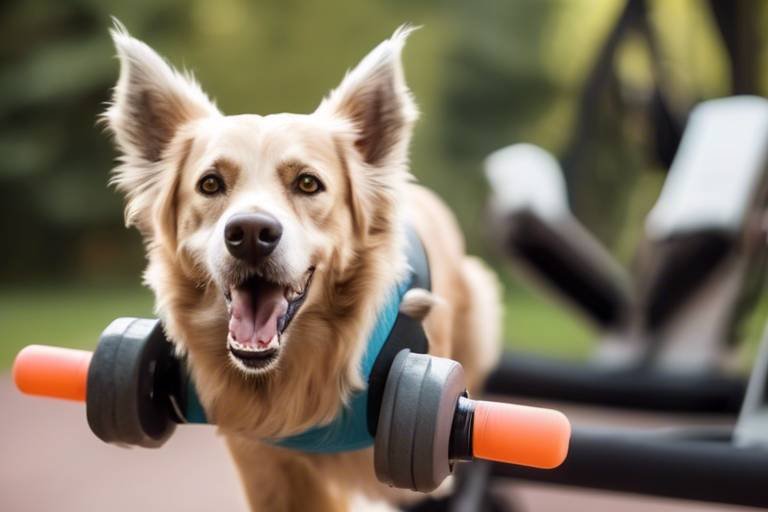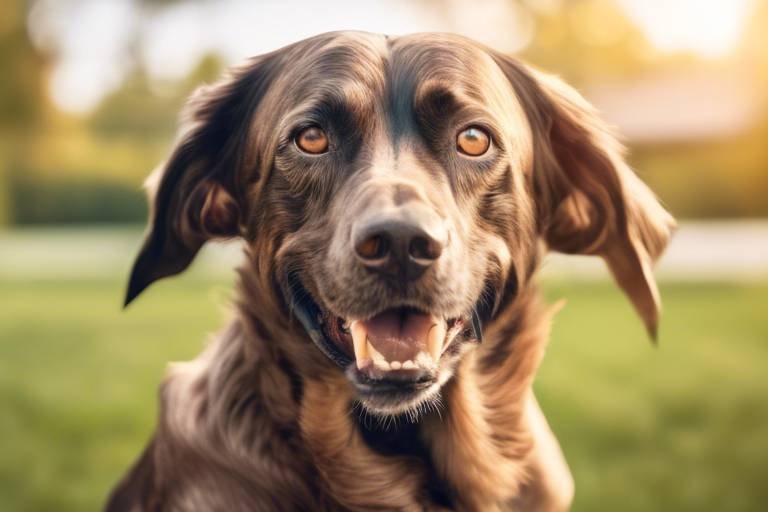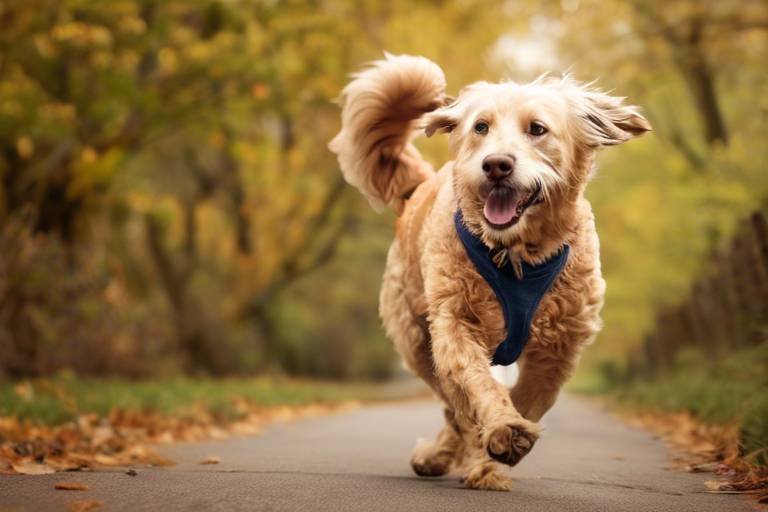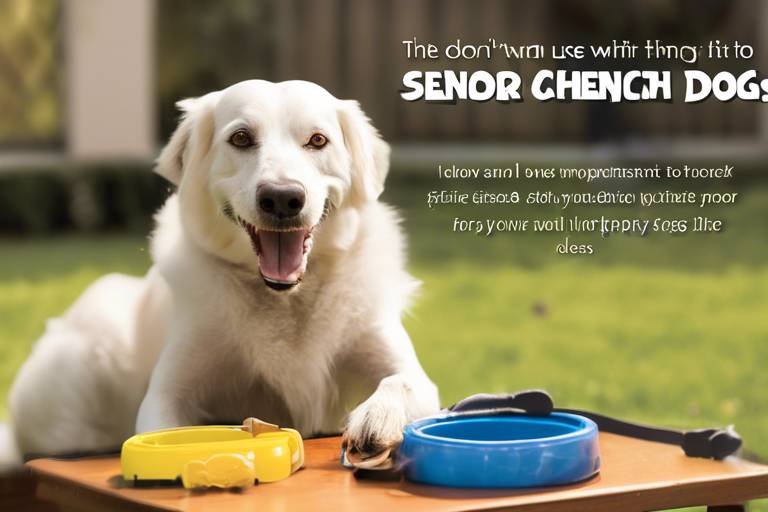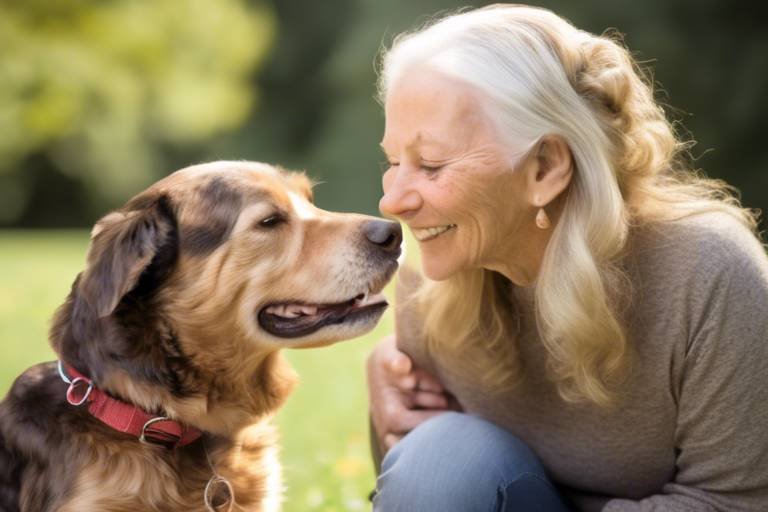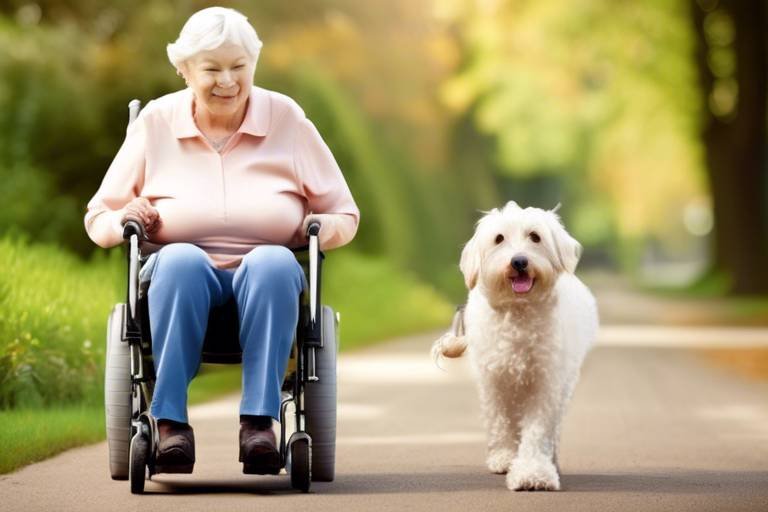Understanding the Signs of Aging in Small Dog Breeds
As our beloved furry companions grow older, it becomes increasingly important for us as pet owners to recognize the signs of aging in small dog breeds. Aging is a natural process, but it can come with a host of changes that may affect your dog's quality of life. Understanding these signs not only helps in identifying when your pet may need special care, but it also allows you to adapt your approach to their needs, ensuring they enjoy their golden years to the fullest. So, what exactly should you be on the lookout for? Let's dive into the various physical and behavioral changes that signal the passage of time in your small dog.
As small dogs age, they exhibit several physical changes that can be quite noticeable. You might first observe a change in their coat, with the fur becoming grayer, particularly around the muzzle and eyes. This graying is often a sign of maturity, but it can also indicate the stress your dog may be experiencing. Alongside the graying fur, you may notice a decrease in energy levels. Your once energetic pup might prefer lounging on the couch instead of running around the yard. This doesn't mean they aren't happy; it simply reflects their changing energy needs.
Another significant change can be in their weight. Aging dogs may experience weight gain or loss, both of which could be indicative of underlying health issues. For instance, weight gain can lead to obesity, which is a common problem in older dogs, while weight loss might signal health concerns such as dental issues or digestive problems. It's essential to monitor these changes closely and consult your veterinarian if anything seems off.
Behavioral shifts can also accompany aging. You might notice your dog becoming more anxious or less social. For example, a dog that once enjoyed playdates may now prefer quiet time alone. Changes in sleeping patterns are also common; older dogs often sleep more during the day and may have trouble settling down at night. These changes can be distressing for both you and your pet, but recognizing them early can help you make necessary adjustments to their routine and environment.
Just like humans, dogs can experience cognitive decline as they age. This condition, often likened to dementia in people, can manifest in various ways. You may notice your dog becoming disoriented or confused, especially in familiar settings. For instance, they may forget where their food bowl is or fail to respond to commands they once knew well. Recognizing these changes is crucial, as they can significantly impact your dog's quality of life.
Canine Cognitive Dysfunction (CCD) can present itself through a variety of signs. Increased vocalization, such as barking or whining for no apparent reason, is a common symptom. Additionally, disrupted sleep patterns might result in your dog waking up frequently during the night. You may also observe a loss of house-training skills, which can be frustrating but is often a symptom of cognitive decline rather than a behavioral issue. Understanding these signs can aid in early detection and management of CCD.
Fortunately, there are several strategies to help manage cognitive decline in aging dogs. Engaging your dog in mental stimulation through puzzle toys or training exercises can keep their minds active. Dietary adjustments, such as incorporating special senior dog foods that support brain health, can also be beneficial. In some cases, your veterinarian may recommend medication to help manage symptoms and improve your dog's quality of life.
As small dog breeds age, they can face specific health challenges that require your attention. Common issues include dental disease, arthritis, and heart problems. Regular veterinary check-ups are essential for monitoring these conditions, as early detection can lead to more effective treatment. Being aware of these potential health issues allows you to be proactive about your dog's health, ensuring they receive the care they need as they age.
Proper nutrition is vital for maintaining the health of aging small dogs. As their metabolism slows down, it becomes important to adjust their diet accordingly. This might mean switching to a senior dog food that is lower in calories but rich in essential nutrients. A balanced diet can help manage weight and provide the necessary support for their aging bodies, keeping them energetic and healthy.
Selecting the right dog food for senior dogs involves considering their specific needs. Look for options that offer lower calories, joint support, and easily digestible ingredients. These factors are crucial for promoting overall health and vitality in your aging pet. Don't hesitate to consult your veterinarian for recommendations tailored to your dog's individual needs.
Supplements can play a crucial role in supporting the health of aging dogs. Common supplements include omega fatty acids, glucosamine, and antioxidants. These can help maintain mobility, support joint health, and boost overall well-being. Incorporating the right supplements into your dog's diet can make a noticeable difference in their energy levels and quality of life.
Routine veterinary visits are essential for monitoring the health of aging small dogs. Regular check-ups can help detect health issues early and ensure appropriate preventive care is provided. During these visits, your veterinarian can assess your dog's overall health, recommend necessary vaccinations, and suggest lifestyle changes that can enhance their quality of life.
Maintaining up-to-date vaccinations and preventive care is crucial for senior dogs. This includes flea and tick prevention, dental care, and screenings for common age-related health problems. Keeping your dog protected from preventable diseases is a vital part of ensuring their health and longevity.
It's important to recognize certain signs in aging small dogs that warrant immediate veterinary attention. Sudden weight loss, difficulty breathing, or severe lethargy are red flags that should never be ignored. By being vigilant and responsive to these signs, you can potentially save your pet's life and ensure they receive the care they need.
- What are the first signs of aging in small dogs? Common signs include graying fur, decreased energy levels, and changes in weight.
- How can I help my aging dog with cognitive decline? Engage them in mental stimulation, consider dietary adjustments, and consult your vet for possible medications.
- What should I feed my senior dog? Look for senior dog foods that are lower in calories and high in essential nutrients, and consider supplements as needed.
- How often should my aging dog see the vet? Regular check-ups are recommended at least twice a year, or more frequently if your dog has existing health issues.

Common Physical Signs of Aging
This article explores the various signs of aging in small dog breeds, helping owners identify changes in their pets and understand how to provide the best care during their golden years.
As our beloved small dogs reach their golden years, they start to show a variety of physical changes that can be both subtle and significant. One of the most noticeable signs is graying fur. Just like humans, dogs can develop gray hair, particularly around their muzzles and eyes. This change can be a bittersweet reminder of their age, but it also signifies the wisdom they’ve gained over the years.
Another common sign is a decrease in energy levels. If your once playful pup now prefers lounging on the couch over chasing after toys, it might be time to pay attention. This decrease in activity can be attributed to various factors, including joint pain or fatigue. It's essential to monitor these changes closely, as they can indicate underlying health issues.
Weight changes are also prevalent in aging dogs. Some may experience weight gain due to decreased activity, while others might lose weight due to health problems or changes in metabolism. Keeping an eye on your dog’s weight is crucial. A sudden shift can signal health concerns that need to be addressed. Below is a table summarizing common physical signs of aging:
| Sign | Description |
|---|---|
| Graying Fur | Appearance of gray or white hair, especially around the muzzle. |
| Decreased Energy | Less enthusiasm for play and longer recovery times after activity. |
| Weight Changes | Gain or loss of weight, which may indicate health issues. |
| Stiffness | Difficulty in getting up or moving around, often due to arthritis. |
| Dental Issues | Bad breath, gum disease, or tooth loss are common in older dogs. |
Additionally, you might notice stiffness or difficulty in movement. This can be particularly evident after your dog has been resting for a while. If they seem to struggle getting up or appear to be limping, it could be a sign of arthritis or other joint problems. Regular exercise, tailored to their ability, can help manage these symptoms.
Finally, dental health is often overlooked but becomes increasingly important as dogs age. Dental issues, such as gum disease or tooth decay, can cause pain and discomfort. Regular dental check-ups and cleanings are essential to ensure your dog maintains a healthy mouth, which is crucial for their overall well-being.
- What are the first signs of aging in small dog breeds?
The first signs often include graying fur, decreased energy levels, and changes in weight. - How can I help my aging dog maintain a healthy weight?
Adjust their diet to include lower-calorie foods and ensure they get regular, gentle exercise. - When should I take my aging dog to the vet?
Regular check-ups are important, but any sudden changes in behavior or health should prompt a visit.

Behavioral Changes to Watch For
As our beloved small dogs age, it's not just their physical health that changes; their behavior can shift significantly as well. These changes can sometimes be subtle, but as a responsible pet owner, it's crucial to recognize them early on. Just like how humans may become more forgetful or anxious with age, dogs can exhibit similar behavioral patterns. You might notice that your once playful pup is now more reserved, or perhaps they seem more anxious when left alone. These behavioral changes can often be indicators of underlying issues that need attention.
One of the most common behavioral shifts in aging dogs is an increase in anxiety. This can manifest as restlessness, excessive barking, or even destructive behavior when left alone. If your dog used to be calm during your absence but now seems distressed, it might be time to evaluate their emotional well-being. Additionally, changes in sleeping patterns are another sign to watch for. Older dogs may sleep more than they used to, or conversely, they might have trouble settling down at night. This can lead to disrupted sleep for both you and your furry friend!
Moreover, social interactions can change dramatically as dogs age. They may become less tolerant of young, energetic pets or even humans. This is often due to a decrease in energy levels or discomfort from age-related health issues. If your dog used to engage in play with other dogs but now prefers solitude, it could be a sign of discomfort or even a decline in cognitive function. Recognizing these changes early on can help you adapt your lifestyle to better suit your dog's evolving needs.
To help you identify these behavioral changes, here’s a quick overview:
| Behavioral Change | Possible Indicator |
|---|---|
| Increased Anxiety | Restlessness, barking, destructive behavior |
| Altered Sleeping Patterns | Excessive sleeping or insomnia |
| Social Withdrawal | Less interaction with other pets or people |
Being aware of these signs allows you to provide the necessary support and adjustments to your dog's environment. For instance, creating a calm space for your dog can help alleviate anxiety. This could be a cozy bed in a quiet room where they feel secure. Additionally, maintaining a consistent routine can provide comfort and stability in their lives. Remember, it's not just about recognizing the changes; it's about understanding your dog's needs during this transitional phase.
In conclusion, observing behavioral changes in your aging small dog is essential for ensuring they lead a happy and healthy life. By paying close attention to their emotional and social needs, you can make informed decisions that enhance their quality of life. After all, our furry companions deserve the best care, especially as they enter their golden years.
- What are some common signs of aging in small dog breeds? Aging dogs may show signs like graying fur, decreased energy, and changes in behavior.
- How can I help my aging dog with anxiety? Providing a calm environment, maintaining a routine, and consulting a veterinarian for behavioral therapies can help.
- Are there specific health issues I should watch for in aging small dogs? Yes, common issues include dental disease, arthritis, and heart problems.
- How often should I take my aging dog to the vet? Regular check-ups, ideally every six months, are recommended to monitor their health.
Cognitive Decline in Senior Dogs
Cognitive decline in senior dogs is a reality that many pet owners may not want to confront, yet it’s essential to recognize and understand. Just like humans, our furry companions can experience a decline in cognitive function as they age. This condition, often likened to dementia in people, can manifest in several ways that may leave owners feeling concerned and confused. Imagine your once lively pup, who used to greet you at the door with boundless energy, now seeming a bit lost and disoriented. It can be heartbreaking to witness these changes, but being aware of the signs can help you provide the best care possible.
One of the most noticeable signs of cognitive decline is disorientation. You may find your dog staring blankly at walls, wandering aimlessly around the house, or even forgetting familiar routes during walks. This confusion can be alarming, especially if your dog has always been independent and alert. Additionally, dogs experiencing cognitive decline may show changes in their reaction to commands. A once responsive pup may begin to ignore your calls or commands, which can be frustrating and concerning.
Another critical area to observe is your dog's sleep patterns. Senior dogs with cognitive dysfunction often exhibit disrupted sleep cycles, which can lead to increased vocalization during the night. You might find your dog barking or whining for no apparent reason, which can be distressing for both the pet and the owner. It’s as if they’re trapped in a dream, unable to find their way back to a peaceful slumber.
Furthermore, changes in social interactions can also be a red flag. Some dogs may become more anxious or withdrawn, preferring solitude over the companionship they once cherished. Others might become more clingy, seeking constant reassurance from their owners. Recognizing these behavioral shifts is crucial because they can significantly impact your dog's quality of life.
Understanding cognitive decline is the first step towards managing it. By observing these signs and noting any changes in your dog's behavior, you can take proactive measures to support their well-being. Regular mental stimulation through interactive toys, puzzle games, and training sessions can help keep your dog's mind sharp. It’s like giving them a workout for their brain, helping to slow down the progression of cognitive decline.
Moreover, dietary adjustments can play a vital role in managing cognitive decline. Foods rich in antioxidants and omega fatty acids can support brain health. Think of it as providing your dog with the superfoods they need to thrive in their golden years. You might also consider discussing supplements with your veterinarian, as certain products are specifically designed to support cognitive function in aging dogs.
In conclusion, while cognitive decline in senior dogs can be challenging, awareness and early intervention can make a significant difference. By recognizing the signs and taking steps to support your furry friend, you can help them navigate this stage of life with dignity and comfort. Remember, your love and attention are the best remedies for your aging companion.
- What are the early signs of cognitive decline in dogs?
Early signs can include disorientation, changes in sleep patterns, and altered responses to commands. - Can cognitive decline be treated?
While it cannot be reversed, there are ways to manage it through mental stimulation, diet, and supplements. - How can I help my dog with cognitive decline?
Engage them in regular mental and physical activities, provide a balanced diet, and consult your veterinarian for tailored advice. - Is cognitive decline common in small dog breeds?
Yes, cognitive decline can affect dogs of all sizes, but small breeds may show symptoms earlier due to their longer lifespan.
Signs of Canine Cognitive Dysfunction
As our beloved small dogs age, they can experience a range of cognitive changes that may mirror some of the challenges faced by humans, particularly those struggling with dementia. This condition, known as Canine Cognitive Dysfunction (CCD), manifests in various ways, and recognizing these signs early can make a significant difference in managing your dog's quality of life. One of the first indicators of CCD may be a noticeable disorientation. You might find your furry friend wandering aimlessly around the house, appearing lost in familiar surroundings. This can be particularly alarming when you notice them staring blankly at walls or getting stuck in corners.
Another common sign is a shift in vocalization. If your dog suddenly starts barking or howling more than usual, it could be a cry for help, stemming from confusion or anxiety. Additionally, changes in sleeping patterns are prevalent. You may notice that your once peaceful pup is now restless at night, pacing or having trouble settling down. This disruption can lead to a cycle of fatigue, making it even harder for them to cope during the day.
Moreover, loss of house-training skills is a troubling symptom of CCD. If your dog has been reliable in their bathroom habits and suddenly begins having accidents indoors, it can be a sign that their cognitive function is declining. This can be frustrating for both you and your pet, as it may lead to feelings of shame or confusion for them.
In addition to these behavioral changes, you might observe alterations in their social interactions. Dogs with CCD may become less interested in playing or engaging with family members, which can be heartbreaking for owners who cherish these moments. They might also show signs of increased anxiety, becoming more clingy or fearful of new experiences or environments. This can create a cycle of stress for both the dog and the owner, making it essential to address these changes promptly.
To summarize, here are some key signs of Canine Cognitive Dysfunction to watch for:
- Disorientation or confusion in familiar environments
- Increased vocalization, such as barking or howling
- Changes in sleeping patterns, including restlessness at night
- Loss of house-training skills
- Altered social interactions and decreased interest in activities
- Increased anxiety or fearfulness
Understanding these signs is crucial not only for identifying potential issues but also for seeking timely veterinary care. Early intervention can lead to better management of your dog's condition, allowing you to implement strategies that can enhance their quality of life, such as mental stimulation and dietary changes. Remember, your small dog depends on you to notice these changes and provide the support they need as they navigate their golden years.
Q: What should I do if I notice signs of cognitive dysfunction in my dog?
A: If you observe any signs of cognitive dysfunction, it’s important to consult your veterinarian. They can help diagnose the issue and recommend appropriate treatments or lifestyle adjustments.
Q: Are there specific breeds more prone to cognitive dysfunction?
A: While any dog can experience cognitive decline, certain small breeds like Dachshunds and Poodles may be more susceptible. Regular monitoring is key.
Q: Can cognitive dysfunction be treated?
A: While there is no cure for CCD, there are management strategies available, including medications, dietary changes, and mental exercises that can improve your dog's quality of life.
Q: How can I help stimulate my aging dog's mind?
A: Engage your dog with puzzle toys, training exercises, and interactive games. These activities can help keep their mind sharp and provide mental enrichment.
Managing Cognitive Decline
As our beloved small dogs age, it's not just their bodies that change; their minds do too. Managing cognitive decline is crucial for ensuring that your furry friend enjoys their golden years with as much joy and comfort as possible. Think of it like giving them a mental workout—just as we need to keep our brains active, so do our pets! Here are some effective strategies to help manage cognitive decline:
First and foremost, mental stimulation is key. Engaging your dog in interactive games or puzzle toys can keep their minds sharp. Activities like hide-and-seek or teaching them new tricks can be both fun and beneficial. Consider setting aside a few minutes each day for these activities; it’s a great way to bond while keeping their cognitive skills active.
Next, dietary adjustments can play a significant role in managing cognitive decline. Look for dog foods that are specifically formulated for senior dogs, as these often contain ingredients that promote brain health, such as antioxidants and omega-3 fatty acids. You might also want to consult your veterinarian about adding supplements that support cognitive function.
Additionally, consistent routines can help alleviate anxiety and confusion in aging dogs. Try to keep feeding times, walks, and playtimes regular. A predictable routine can provide a sense of security, making your dog feel more at ease in their environment.
Lastly, if your dog is showing significant signs of cognitive decline, don't hesitate to consult your veterinarian about medications that can help manage symptoms. There are treatments available that can improve your dog’s quality of life, making their twilight years more enjoyable. Always remember, early intervention is key!
In summary, managing cognitive decline in small dogs is about keeping their minds active, ensuring they have a nutritious diet, establishing a comforting routine, and seeking professional help when necessary. With the right approach, you can help your furry friend navigate their senior years with grace and happiness.
- What are the first signs of cognitive decline in dogs? Look for signs like disorientation, changes in sleeping patterns, and increased anxiety.
- Can cognitive decline be reversed? While it can't be reversed, certain strategies can help manage symptoms and improve quality of life.
- How often should I engage my senior dog in mental activities? Aim for at least 10-15 minutes of mental stimulation daily to keep their minds sharp.
- Are there specific diets that can help with cognitive decline? Yes, diets rich in antioxidants and omega-3 fatty acids are beneficial for brain health in senior dogs.
Health Issues Common in Aging Small Breeds
This article explores the various signs of aging in small dog breeds, helping owners identify changes in their pets and understand how to provide the best care during their golden years.
As small dogs age, they exhibit several physical changes. These can include graying fur, decreased energy levels, and changes in weight, which may indicate underlying health issues.
Aging can lead to shifts in behavior, such as increased anxiety, changes in sleeping patterns, or altered social interactions. Recognizing these signs is crucial for maintaining your dog's well-being.
Cognitive decline, similar to dementia in humans, can affect small dogs. Symptoms may include disorientation, confusion, and changes in how they respond to commands or familiar environments.
Canine Cognitive Dysfunction (CCD) manifests through various signs, including increased vocalization, disrupted sleep patterns, and loss of house-training skills. Understanding CCD can aid in early detection and management.
There are strategies to manage cognitive decline in aging dogs, including mental stimulation, dietary adjustments, and medication. These approaches can help improve their quality of life.
As our beloved small dogs grow older, they become susceptible to a variety of health issues that can significantly impact their quality of life. One of the most common problems is dental disease. Small breeds often have crowded teeth, which can lead to plaque buildup and periodontal disease. Regular dental check-ups and cleanings are essential to prevent painful infections.
Another prevalent issue is arthritis. This degenerative joint disease can cause discomfort and limit mobility. Small dogs, particularly those that are overweight, are at a higher risk. Signs of arthritis may include difficulty climbing stairs, reluctance to jump, or a noticeable change in their playfulness.
Heart problems are also a significant concern for aging small breeds. Conditions like congestive heart failure can develop silently, making it crucial for owners to be vigilant about any signs of coughing, fatigue, or difficulty breathing. Regular veterinary visits can help catch these issues early, allowing for timely intervention.
Lastly, small dogs may face challenges related to their weight. Obesity is a common issue that can exacerbate other health problems, including diabetes and joint pain. It’s essential to monitor their diet and ensure they get adequate exercise, even as their energy levels decline.
| Health Issue | Symptoms | Preventive Measures |
|---|---|---|
| Dental Disease | Painful gums, bad breath, difficulty eating | Regular dental check-ups and cleanings |
| Arthritis | Stiffness, limping, reluctance to move | Weight management, joint supplements |
| Heart Problems | Coughing, fatigue, difficulty breathing | Regular vet check-ups, heart-healthy diet |
| Obesity | Excess weight, lethargy, difficulty exercising | Controlled diet, regular exercise |
Proper nutrition is vital for maintaining the health of aging small dogs. Adjusting their diet can help manage weight and provide essential nutrients to support their aging bodies.
Selecting the right dog food for senior dogs involves considering their specific needs, including lower calories, joint support, and easily digestible ingredients to promote overall health and vitality.
Supplements can play a crucial role in supporting the health of aging dogs. Common supplements include omega fatty acids, glucosamine, and antioxidants, which help maintain mobility and overall well-being.
Routine veterinary visits are essential for monitoring the health of aging small dogs. Regular check-ups can help detect health issues early and ensure appropriate preventive care is provided.
Maintaining up-to-date vaccinations and preventive care is crucial for senior dogs. This includes flea and tick prevention, dental care, and screenings for common age-related health problems.
Certain signs in aging small dogs, such as sudden weight loss, difficulty breathing, or severe lethargy, warrant immediate veterinary attention. Recognizing these red flags can save your pet's life.
- What are the first signs of aging in small dogs? Common signs include graying fur, decreased energy, and changes in behavior.
- How often should I take my aging dog to the vet? Regular check-ups are recommended at least twice a year.
- Can diet affect my dog's aging process? Absolutely! A balanced diet can help manage weight and support overall health.
- What supplements should I consider for my senior dog? Omega fatty acids, glucosamine, and antioxidants are beneficial for aging dogs.

Nutrition for Aging Dogs
As our beloved furry friends age, their nutritional needs change significantly. Just like how we might crave different foods as we grow older, small dogs require a tailored diet that supports their unique health challenges. One of the key aspects of caring for an aging dog is ensuring they receive the right balance of nutrients to maintain their vitality and overall well-being. A well-balanced diet can help manage weight, promote healthy digestion, and support joint health, which becomes increasingly important as they enter their golden years.
When considering nutrition for aging dogs, it’s essential to focus on high-quality ingredients that are easy to digest. Many senior dog foods are formulated with fewer calories to prevent obesity, which can lead to a myriad of health issues. Additionally, look for foods that include joint-supporting ingredients, such as glucosamine and chondroitin, to help alleviate arthritis symptoms that are common in older dogs. A diet rich in omega fatty acids can also contribute to improved coat health and reduce inflammation.
To give you a clearer picture, here’s a simple comparison of what to look for in senior dog food:
| Nutrient | Importance | Sources |
|---|---|---|
| Low Calories | Helps maintain a healthy weight | Lean meats, vegetables |
| Joint Support | Reduces arthritis pain | Glucosamine, fish oil |
| High Fiber | Improves digestion | Whole grains, vegetables |
| Antioxidants | Boosts immune function | Fruits, vegetables |
In addition to selecting the right dog food, many pet owners find that adding supplements can enhance their dog's diet further. Common supplements for senior dogs include omega fatty acids, which help maintain a shiny coat and healthy skin, and antioxidants that can combat the effects of aging on cellular health. Always consult with your veterinarian before introducing new supplements to ensure they are appropriate for your dog’s specific health needs.
It’s also crucial to monitor your dog’s weight and adjust their food intake accordingly. Just like humans, dogs can gain weight as they become less active, leading to further health complications. Regularly weighing your dog and consulting with your vet can help you keep their weight in check and make necessary dietary adjustments.
Overall, providing the right nutrition for your aging small dog is a vital part of ensuring they lead a happy, healthy life. By being mindful of their dietary needs, you can help them enjoy their golden years with energy and vitality. Remember, a little extra care in their nutrition can lead to a world of difference in their quality of life!
- What should I feed my aging dog? Look for high-quality senior dog food that is lower in calories and includes joint-supporting ingredients.
- Are supplements necessary for senior dogs? While not always necessary, supplements like omega fatty acids and antioxidants can be beneficial for overall health.
- How can I tell if my dog is overweight? Regularly weigh your dog and consult your vet. Look for signs like difficulty in getting up or excessive panting during walks.
- Can I cook for my aging dog? Yes, but ensure you provide a balanced diet with all necessary nutrients. Consulting with a vet or pet nutritionist is advisable.
Choosing the Right Dog Food
Choosing the right dog food for your aging small breed is like finding the perfect pair of shoes; it needs to fit just right and support your lifestyle. As your furry friend grows older, their nutritional needs change significantly. It's not just about filling their bowl; it's about providing the right balance of nutrients to keep them healthy and happy. So, what should you look for when selecting dog food for your senior pup?
First off, consider the caloric content. Aging dogs tend to be less active, which means they require fewer calories to maintain a healthy weight. Look for dog foods specifically formulated for seniors, as these usually have reduced calorie counts to prevent obesity, which can lead to a myriad of health issues. You want to keep your little buddy trim and fit, just like a well-maintained sports car!
Next, pay attention to joint support. Small breeds are often prone to joint problems as they age, so choosing a diet that includes ingredients like glucosamine and chondroitin can be beneficial. These components help in maintaining healthy joints, allowing your dog to enjoy their daily walks and playtime without discomfort. Think of it as giving them a little extra cushion for their joints!
Moreover, the digestibility of the food is crucial. Aging dogs may have less efficient digestive systems, so opt for foods with high-quality, easily digestible ingredients. Look for proteins from real meat sources and avoid fillers like corn and soy. A good rule of thumb is to check if the first ingredient is a named meat source, such as chicken or lamb. This ensures your dog is getting the best possible nutrition.
Lastly, don’t forget to incorporate essential fatty acids into their diet. Omega-3 and Omega-6 fatty acids can help maintain a healthy coat and skin, which is particularly important for older dogs that may experience dryness or skin issues. Additionally, these fatty acids support brain health, which is essential as cognitive decline can be a concern in senior dogs.
To help you further, here’s a quick summary of what to look for when choosing dog food for your aging small breed:
| Feature | Description |
|---|---|
| Caloric Content | Lower calories to prevent obesity |
| Joint Support | Includes glucosamine and chondroitin |
| Digestibility | High-quality, easily digestible ingredients |
| Essential Fatty Acids | Omega-3 and Omega-6 for coat and brain health |
In conclusion, choosing the right dog food for your aging small breed is a vital part of ensuring their health and happiness. By focusing on their specific nutritional needs, you're not only enhancing their quality of life but also showing them just how much you care. Remember, a well-fed dog is a happy dog!
- What should I avoid when selecting dog food for senior dogs? Avoid foods with fillers like corn and soy, and those with artificial preservatives. Always look for high-quality ingredients.
- How can I tell if my dog is overweight? You should be able to feel your dog's ribs without too much pressure. If you can't, they may need to shed a few pounds.
- Is homemade dog food a good option for senior dogs? Homemade dog food can be beneficial if prepared correctly, but it’s essential to consult with your vet to ensure it meets all nutritional requirements.
- How often should I feed my senior dog? Most senior dogs do well with two meals a day, but it's best to consult your veterinarian for personalized advice.
Supplements for Senior Dogs
As our beloved furry friends age, their nutritional needs evolve, and supplements can play a crucial role in supporting their health and well-being. Just like humans, senior dogs can benefit from additional nutrients that help maintain their vitality and manage age-related health issues. Understanding which supplements to include in your dog's diet can make a significant difference in their quality of life.
One of the most popular supplements for senior dogs is omega fatty acids. These essential fats are known for their anti-inflammatory properties and can help support joint health, improve skin and coat condition, and promote overall cardiovascular health. Omega-3 fatty acids, in particular, are beneficial for reducing inflammation associated with arthritis, which is a common ailment in aging small breeds.
Another important supplement is glucosamine, which is often recommended for dogs experiencing joint pain or stiffness. This compound helps maintain the health of cartilage, the tissue that cushions joints, and can alleviate symptoms of osteoarthritis. Many dog owners report noticeable improvements in their pets' mobility after incorporating glucosamine into their diet.
Additionally, antioxidants such as vitamins C and E can support your dog's immune system and combat oxidative stress, which increases as dogs age. These powerful nutrients help protect cells from damage and can contribute to a healthier, longer life. Incorporating a combination of these supplements into your dog's routine can create a formidable defense against the challenges of aging.
When considering supplements for your senior dog, it's essential to consult with your veterinarian. They can provide personalized recommendations based on your dog's specific health needs and conditions. Furthermore, not all supplements are created equal, so choosing high-quality products from reputable brands is crucial. Below is a table summarizing some common supplements and their benefits:
| Supplement | Benefits |
|---|---|
| Omega Fatty Acids | Supports joint health, improves skin/coat condition, promotes cardiovascular health |
| Glucosamine | Helps maintain cartilage health, alleviates joint pain and stiffness |
| Antioxidants | Supports immune system, combats oxidative stress, protects cells from damage |
In conclusion, supplements can be a game-changer for senior dogs, enhancing their quality of life and helping them navigate their golden years with ease. By being proactive and informed, you can ensure that your furry companion receives the best care possible as they age.
Q1: How do I know if my dog needs supplements?
A1: If your dog is showing signs of aging, such as decreased energy, joint stiffness, or changes in appetite, it may benefit from supplements. Always consult your veterinarian for personalized advice.
Q2: Are all supplements safe for dogs?
A2: Not all supplements are safe for dogs. It's important to choose high-quality products and consult with your vet to ensure they are appropriate for your dog's specific health needs.
Q3: How long does it take to see results from supplements?
A3: The time it takes to see results can vary based on the supplement and the individual dog. Some may notice improvements within a few weeks, while others may take longer. Consistency is key!

Regular Veterinary Check-ups
As our beloved small dog breeds gracefully age, become an essential part of their healthcare routine. Just like we visit our doctors for annual check-ups to catch potential health issues early, our furry friends need the same attention. These visits play a critical role in monitoring their overall health and ensuring they receive timely interventions when necessary. Imagine a small dog, once full of energy, now moving slower and showing signs of discomfort. Regular vet visits can help identify the underlying issues causing these changes.
During these check-ups, veterinarians will typically conduct a thorough examination, which may include:
- Weight assessment: Keeping track of your dog's weight is crucial, as obesity can lead to various health problems.
- Dental check: Dental disease is common in aging small breeds, and regular cleanings can prevent serious complications.
- Blood tests: Routine blood work can help identify kidney or liver issues, diabetes, or other age-related diseases before they become serious.
- Vaccination updates: Ensuring your dog is up-to-date on vaccinations is vital for their health, especially as their immune system may weaken with age.
It's important to maintain open communication with your veterinarian. Share any observations you have noticed about your dog's behavior or health changes. For instance, if your dog seems more anxious or is having trouble with mobility, these insights can guide the vet in providing the best care possible.
Moreover, regular check-ups allow for preventive measures that can significantly enhance your dog's quality of life. For example, your vet might recommend specific supplements or dietary changes tailored to your dog's needs. By taking a proactive approach, you can help manage potential health issues before they escalate.
To help you keep track of your dog's veterinary visits, consider creating a simple check-up schedule. Here’s an example:
| Date | Reason for Visit | Vet's Recommendations |
|---|---|---|
| 01/15/2023 | Annual Check-up | Weight management plan, dental cleaning schedule |
| 07/20/2023 | Dental Check | Teeth cleaning, new dental chew recommendations |
Remember, while we want our dogs to enjoy their golden years, we also want to ensure they do so with the best health possible. Regular veterinary check-ups not only help in early detection of health issues but also provide peace of mind for pet owners. After all, a happy dog is a healthy dog!
- How often should I take my aging small dog to the vet? It's recommended to schedule check-ups at least twice a year for senior dogs.
- What should I expect during a vet visit? Expect a thorough physical exam, weight check, and possibly blood tests to monitor health.
- Are there specific vaccinations my senior dog needs? Yes, senior dogs may require different vaccinations based on their health status and lifestyle.
Vaccinations and Preventive Care
When it comes to ensuring the health and longevity of your aging small dog, play a pivotal role. Just like humans, dogs require regular vaccinations to protect them from various diseases, especially as their immune systems may not be as robust in their golden years. It's crucial to keep your furry friend up-to-date with their shots, as this can prevent serious health issues that could arise from preventable diseases.
In addition to vaccinations, preventive care encompasses a range of health checks and treatments that can help catch potential problems before they escalate. Regular veterinary visits allow your vet to assess your dog's overall health, monitor for any signs of age-related conditions, and provide necessary treatments. For small breeds, common concerns include dental disease, which can lead to more severe health issues if not addressed. Therefore, your vet might recommend a dental cleaning or specific dental care products to maintain your dog's oral health.
Moreover, preventive care isn't just about what happens at the vet's office. It extends to your daily routine with your dog. Here are some essential aspects of preventive care that you should consider:
- Flea and Tick Prevention: These parasites can cause significant discomfort and lead to serious health issues. Using preventive treatments regularly can keep your dog safe.
- Heartworm Prevention: Heartworm disease is a serious condition that can be fatal if not treated. Monthly preventatives are essential for keeping your dog protected.
- Regular Check-ups: Aim for at least bi-annual vet visits for senior dogs. This allows for early detection of any health concerns.
- Vaccination Updates: Ensure that your dog receives their booster shots as recommended by your veterinarian.
It's important to communicate openly with your veterinarian about your dog's health and any changes you notice. They can provide tailored advice based on your dog's specific needs. In summary, proactive vaccinations and preventive care not only protect your small dog from diseases but also enhance their quality of life as they age.
Q: How often should my senior dog see the vet?
A: Senior dogs should ideally have check-ups every six months to monitor their health closely.
Q: Are there specific vaccinations for senior dogs?
A: Yes, while many vaccinations are standard, your vet may recommend additional boosters or changes based on your dog's health and lifestyle.
Q: What are the signs my dog needs immediate veterinary care?
A: Look out for sudden weight loss, difficulty breathing, severe lethargy, or any unusual behavior. These can be signs of serious health issues.
Signs That Require Immediate Attention
As our beloved small dogs age, they can sometimes exhibit alarming changes that require immediate veterinary attention. It's crucial for pet owners to be vigilant and recognize these signs early on. Ignoring them could lead to serious health complications or even jeopardize your furry friend’s life. For instance, if you notice your dog experiencing sudden weight loss, it could indicate underlying health issues such as diabetes or cancer. Weight loss in small breeds can happen quickly, and it’s essential to address it as soon as possible.
Another red flag to watch for is difficulty breathing. If your dog is panting excessively, has a persistent cough, or seems to be gasping for air, don’t wait for the symptoms to worsen. These could be signs of respiratory distress or heart problems, both of which require immediate intervention. Additionally, severe lethargy is a significant concern. If your dog suddenly becomes less active, shows a lack of interest in their favorite activities, or seems unusually tired, it may be time to consult your veterinarian.
Other alarming signs include:
- Vomiting or diarrhea: Frequent or severe instances could lead to dehydration.
- Changes in appetite: A sudden increase or decrease in hunger can signal health issues.
- Behavioral changes: If your dog becomes unusually aggressive or withdrawn, this could indicate pain or discomfort.
Being aware of these signs can make a world of difference in your dog’s health and well-being. Regular check-ups and open communication with your veterinarian are vital, but your instincts as a pet owner are equally important. Trust your gut; if something feels off, it probably is.
Q: What should I do if I notice any of these signs in my small dog?
A: If you observe any concerning symptoms, it’s best to contact your veterinarian immediately for advice and potential examination.
Q: How often should I take my aging dog for check-ups?
A: Senior dogs should ideally have veterinary check-ups every six months, as they are more prone to health issues.
Q: Are there any specific tests my vet might recommend for an aging dog?
A: Your vet may suggest blood tests, urine analysis, and possibly X-rays to monitor your dog’s health closely.
Q: Can changes in behavior be linked to aging?
A: Yes, behavioral changes can often be a sign of cognitive decline or discomfort, so it’s important to monitor these changes closely.
Frequently Asked Questions
- What are the common signs of aging in small dog breeds?
As your small dog ages, you might notice several physical changes. These can include graying fur, a decrease in energy levels, and fluctuations in weight. These signs often indicate underlying health issues that may need attention.
- How can I recognize behavioral changes in my aging dog?
Aging dogs may exhibit shifts in behavior, such as increased anxiety, altered sleeping patterns, or changes in their social interactions. Being aware of these changes is crucial for maintaining your dog's well-being and happiness.
- What is Canine Cognitive Dysfunction (CCD)?
Canine Cognitive Dysfunction is similar to dementia in humans and can affect your small dog as they age. Symptoms of CCD include disorientation, confusion, and changes in how they respond to commands or familiar environments.
- How can I manage cognitive decline in my senior dog?
Managing cognitive decline can involve several strategies, such as providing mental stimulation, making dietary adjustments, and, if necessary, using medications. These approaches can significantly enhance your dog's quality of life.
- What health issues are common in aging small breeds?
Small dog breeds often face specific health challenges as they grow older. Common issues include dental disease, arthritis, and heart problems. Being aware of these conditions is essential for ensuring timely veterinary intervention.
- How should I adjust my aging dog's diet?
Proper nutrition is vital for maintaining an aging dog's health. Adjusting their diet can help manage weight and provide essential nutrients that support their aging bodies, ensuring they stay as healthy and active as possible.
- What should I look for when choosing dog food for senior dogs?
When selecting food for senior dogs, consider their specific needs, such as lower calorie content, joint support, and easily digestible ingredients. This can help promote overall health and vitality.
- Are supplements beneficial for senior dogs?
Yes, supplements can play a crucial role in supporting the health of aging dogs. Common supplements like omega fatty acids, glucosamine, and antioxidants can help maintain mobility and overall well-being.
- How often should I take my aging dog to the vet?
Routine veterinary visits are essential for monitoring the health of aging small dogs. Regular check-ups can help detect health issues early and ensure that appropriate preventive care is provided.
- What vaccinations and preventive care do senior dogs need?
Maintaining up-to-date vaccinations and preventive care is crucial for senior dogs. This includes flea and tick prevention, dental care, and screenings for common age-related health problems.
- What signs in aging dogs require immediate veterinary attention?
Certain signs, such as sudden weight loss, difficulty breathing, or severe lethargy, warrant immediate veterinary attention. Recognizing these red flags can be vital in saving your pet's life.


